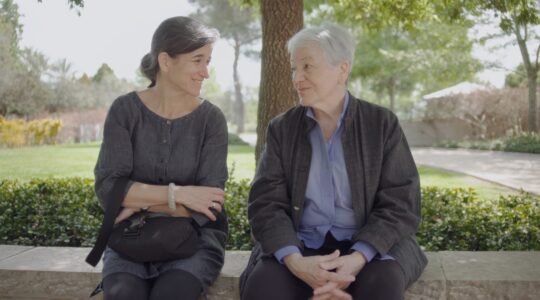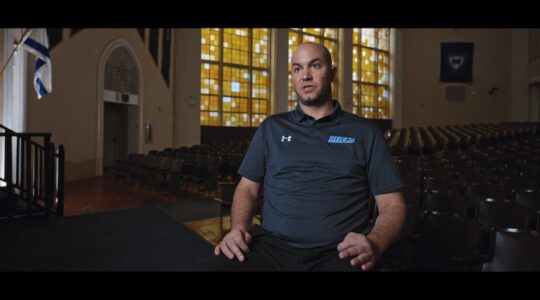A recent poll found that 77 percent of New Yorkers think Mayor Rudolph Giuliani’s private life and the status of his marriage have no impact on how they view him as a Senate candidate.
But might the exceptions include the Orthodox community, whose support for Giuliani has been almost as stalwart as its commitment to the sanctity of marriage and family values? Orthodox groups have recently launched political initiatives, or joined those by Christian groups, to protect the status of marriage. These include opposition to gay rights measures, and supporting the abolition of the so-called "marriage-penalty" for income tax filing.
Giuliani, whose marriage to Donna Hanover has been the subject of speculation for several years (she has not appeared with him publicly since his 1997 inauguration) recently acknowledged having a relationship with Manhattan socialite Judith Nathan, whom he called "a very good friend." The two have been spotted at public events as well as on weekends together in tony Southampton, L.I.
"I think Orthodox voters, like other voters are going to take this into account, among other issues," says Mandell Ganchrow, president of the Orthodox Union. Orthodox voters, generally political conservatives, have overwhelmingly voted for Giuliani in his three mayoral elections and have been key fund raisers. Some Republicans are concerned that the issue could generate support for a more conservative candidate, such as former Westchester Rep. Joe DioGuardi, who is seeking the Conservative and Right-to-Life party nominations.
On Monday, Republican Senate Majority Leader Joseph Bruno, a key Giuliani ally, called on the mayor to patch up his marriage. "It isn’t conversations we want to keep having publicly," he said in an Albany radio interview. "I’m afraid it will detract from the real issues."
Ganchrow says it’s "too early" to gauge the impact of the news, and that he hasn’t heard much talk about it in Orthodox circles.
"When you start looking at people in public life sometimes you have to make value judgements as to how their actions play out in the entire picture," said the Orthodox leader. "Does this one act mean you can no longer support the person, or is it something you wish did not take place but there are other overriding public policy issues?"
Rabbi Milton Balkany, dean of Bais Yaakov of Brooklyn and a Giuliani backer, added, "Some, of course, will be affected, but I don’t think in a major way. Everyone knows that for the last three or four years there have been problems in his marriage."
Joel Schnur, an Orthodox political and public relations consultant, predicted that the issue will have little resonance. "I think most people will view it as a personal issue. We live in a very enlightened society for good or bad, and the Orthodox community has its own standards and strictures. They have accepted personal behavior on the part of numerous elected officials in the past without it impacting on what they needed politically for their community."
Ezra Friedlander, a chasidic candidate for City Council in Borough Park (where Giuliani received more than 90 percent of the vote in 1997) said the issue would have no impact.
"The frum community understands that a public official’s private life should remain so," said Friedlander, a Democrat. "Policy and personal conduct are two separate issues."
Giuliani campaign manager Bruce Teitelbaum declined to comment.
The issue is hardly likely to be used against Giuliani by his Democratic opponent, Hillary Rodham Clinton, whose own marriage has had its public rocky points.
"For people who maintain that there is no difference between Democrats and Republicans, this is the clincher," writes Washington Post columnist Richard Cohen.
Clinton and her husband, however, have at least put forward a public image that their marriage is in good shape, while Hanover recently announced that she had "decisions" to make.
According to the New York Post, Nathan was born Catholic but later became a Presbyterian. Her Jewish ex-husband, Bruce Nathan, was quoted as saying in court depositions during bitter divorce proceedings that she had made ethnic slurs against his Jewish heritage. Judith Nathan has made no comments to the media.
City Comptroller Alan Hevesi says he was profoundly affected by his participation last month in the annual March of the Living pilgrimage, which brings Jewish youth from all over the world to tour Nazi death camps, and then to Israel.
"In the middle of hell, in the middle of the killing fields, were thousands and thousands of Jewish youngsters wearing blue jackets and [carrying] Israeli flags," marveled Hevesi, back in the states. "It was the ultimate revenge on the Nazis."
It was the first visit to Auschwitz by Hevesi, who lost 55 relatives in Hungary and Poland during the Holocaust, many of them at the world’s most infamous death camp. He had previously visited the Mathausen camp in Austria and Bergen Belsen in Germany.
Hevesi, who plans to run for mayor next year, says he returned with "an understanding that while Jews have occasionally prospered, sometimes assimilated and sometimes reached levels of influence in certain societies in the diaspora, on most occasions it didn’t last. Some governments felt compelled to scapegoat the Jewish community."
While in Poland, Hevesi and Kansas state Treasurer Tim Shallenburger, a member of Hevesi’s committee to monitor Holocaust restitution, met with aides to President Aleksander Kwasniewski to discuss the government’s efforts to create a compensation fund for survivors.
"Some members of the Polish parliament have moved to amend the president’s legislation to restrict it to citizens who have lived in Poland for at least five years," said Hevesi. "That provision is dangerous and discriminatory. We are working with the U.S. embassy and the president of Poland to defeat the amendment."
Line Items:
After more than two decades in government, Jeff Wiesenfeld is moving to the private sector. Effective June 12, he will leave the Empire State Development Corporation to become a financial advisor at the Sanford Bernstein investment firm. Wiesenfeld, best-known as the zealous executive assistant and Jewish liaison to Gov. George Pataki and former Sen. Al D’Amato, has also served as an aide to former U.S. Rep. Tom Manton and as a deputy commissioner in the administration of former Mayor Ed Koch.
Wiesenfeld will retain his seat on the City University of New York’s Board of Trusteesn Pataki is expected to sign legislation shortly that would make it easier for a district attorney to seize artwork that may have been stolen during the Holocaust. The bill, sponsored by James Lack (R-Northport, L.I.) in the Senate and Assembly Speaker Sheldon Silver, was prompted by the controversy at the Museum of Modern Art over Egon Schiele paintings, which were confiscated by Manhattan District Attorney Robert Morgenthau. The state Court of Appeals ordered the paintings returned because state law prohibits seizures of loaned artwork.
"This changes the law to allow a DA to question the origins and provenance of any artwork in the state," says Lack. The existing state law would be amended to apply only to civil cases.
The New York Jewish Week brings you the stories behind the headlines, keeping you connected to Jewish life in New York. Help sustain the reporting you trust by donating today.




